Your search “Keep the Death Penalty Abolished fin the Philippfines ”
Document(s)
Felony Murder: An On-Ramp for Extreme Sentencing
By The Sentencing Project, Fair and Just Prosecution, on 23 March 2022
2022
NGO report
United States
More details See the document
Although other countries have largely rejected the felony murder doctrine, 48 states, the District of Columbia, and the federal government still use these laws. Felony murder laws compel harsh decades-long – or even life – sentences even when the individual charged did not directly cause or intend the loss of life.
This report evaluates the legal and empirical foundation, and failings, of the felony murder rule, profiles impacted individuals, and highlights recent reform efforts in 10 jurisdictions. Key findings include:
1. Felony murder laws widen the net of extreme sentencing and are counterproductive to public safety.
2. Felony murder laws have particularly adverse impacts on people of color, young people, and women.
3. Existing reforms must be expanded to achieve justice.
- Document type NGO report
- Countries list United States
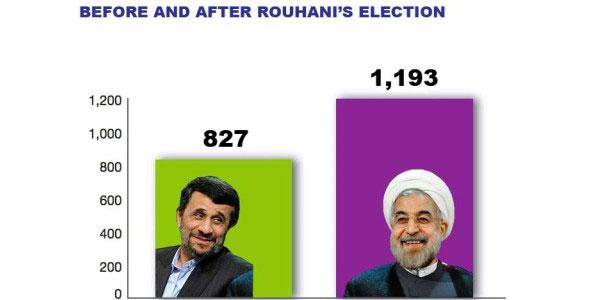
Article(s)
At least 1,193 executions since Hassan Rouhani’s election as president in Iran
on 13 March 2015
The annual report on the death penalty in 2014 shows that the Iranian authorities have executed more than 1193 people since the election of President Rouhani in June 2013. This is an average of more than two executions every day.
2015
Iran (Islamic Republic of)
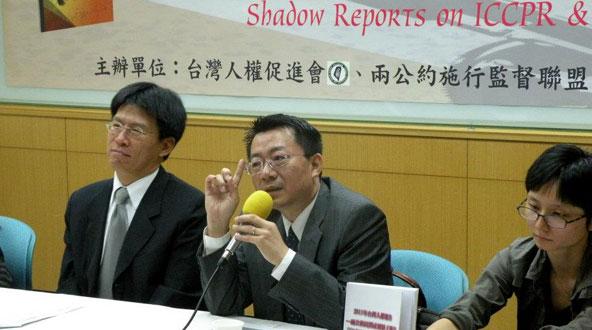
Article(s)
Death penalty at the heart of human rights review
By Thomas Hubert, on 5 February 2013
The Taiwanese authorities have been conducting a voluntary assessment of the human rights situation in the country, culminating in the visit of a panel of experts in late February. The World Coalition is taking part in the process.
2013
Cruel, Inhuman and Degrading Treatment and Punishment
Moratorium
Taiwan
Taiwan

Article(s)
Progress and impediments on path to abolition in U.S.
By Russ Feingold & Christopher Wright Durocher, on 3 April 2024
When President Biden won the 2020 election, he became the first successful U.S. presidential candidate to publicly oppose the death penalty.
2024
United States
Document(s)
Zimbabwe – Universal Periodic Review – Death Penalty – July 2021
By Eleos Justice, Monash University, on 15 July 2021
2021
NGO report
World Coalition
Zimbabwe
More details Download [ pdf - 271 Ko ]
This report addresses Zimbabwe’s compliance with its human rights obligations with respect to its use of the death penalty. The United Nations considers Zimbabwe a de facto abolitionist country. It has not carried out any executions since 2005. Courts, however, continue to sentence individuals to death, with 88 people currently on death row as of December 2020, after 8 sentences were commuted in April 2020. The new Zimbabwean Constitution (the “2013 Constitution”) has replaced the mandatory death penalty with a discretionary sentence for the crime of murder committed under aggravating circumstances. The 2013 Constitution further outlaws the imposition of the death penalty on women, men over the age of 70, and men under the age of 21 at the time the offence was committed. In its 2016 Universal Periodic Review, Zimbabwe noted all recommendations related to the death penalty, partly on the ground that Zimbabwean public opinion did not support abolition of death penalty. Since 2016, developments demonstrate a more positive attitude among the public and opinion leaders toward further reform and the abolition of death penalty.
This report focuses on various issues concerning the death penalty and related international human rights instruments, and on conditions of detention and acts of torture and ill treatment of people in detention. Specifically, this report recommends that Zimbabwe abolish the death penalty, improve detention conditions, ratify relevant human rights treaties, and increase resources dedicated to improving the justice system.
- Document type NGO report / World Coalition
- Countries list Zimbabwe

Article(s)
Abolition of the death penalty at the United Nations Human Rights Council 53rd session
By World coalition against the death penalty, on 18 September 2023
The United Nations Human Rights Council met for its 53rd Regular Session from June 19 to July 14, 2023. If you missed it, here is what happened regarding the abolition of the death penalty!
2023
Trend Towards Abolition
Document(s)
European Court for Human Rights cases involving the death penalty
By European Court for Human Rights Press Unit, on 24 June 2022
2022
International law - Regional body
Regional body report
Cruel, Inhuman and Degrading Treatment and Punishment
Death Row Conditions
Fair Trial
More details See the document
“[T]he [European Court of Human Rights] in Öcalan did not exclude that Article 2 [of the European Convention on Human Rights, protecting the right to life,] had already been amended so as to remove the exception permitting the death penalty. Moreover, … the position has evolved since then. All but two of the Member States have now signed Protocol No. 13 [to the Convention, concerning the abolishment of the death penalty in all circumstances,] and all but three of the States which have signed have ratified it. These figures, together with consistent State practice in observing the moratorium on capital punishment, are strongly indicative that Article 2 has been amended so as to prohibit the death penalty in all circumstances. Against this background, the Court does not consider that the wording of the second sentence of Article 2 § 1 continues to act as a bar to its interpreting the words ‘inhuman or degrading treatment or punishment’ in Article 3 [of the Convention, prohibiting torture and inhuman or degrading treatment,] as including the death penalty …” (Al-Saadoon and Mufdhi v. the United Kingdom judgment of 2 March 2010, § 120).
- Document type International law - Regional body / Regional body report
- Themes list Cruel, Inhuman and Degrading Treatment and Punishment / Death Row Conditions / Fair Trial
Document(s)
Blaming it on the past: Usages of the Middle Ages in contemporary discourses of the death penalty in England
By Death Penalty Research Unit (DPRU), University of Oxford, on 5 February 2024
2024
Academic Article
United Kingdom
More details See the document
Published in December 2023.
In popular, intellectual and political culture, the Middle Ages are intrinsically tied to violent images of public executions. To historians of the medieval period, this temporal attachment of the death penalty to a remote period is puzzling, especially since it is still widely enforced in the world today and was only relatively recently abolished in Europe. Capital punishment is not only a part of history, but a modern-day reality. Why, therefore, do we pin this punishment to the Middle Ages? This paper aims to analyse the discourses surrounding the usage of the Middle Ages in modern discussions on the death penalty, and to clarify medieval practices of capital punishment, showing how remote they are from our contemporary understanding
- Document type Academic Article
- Countries list United Kingdom
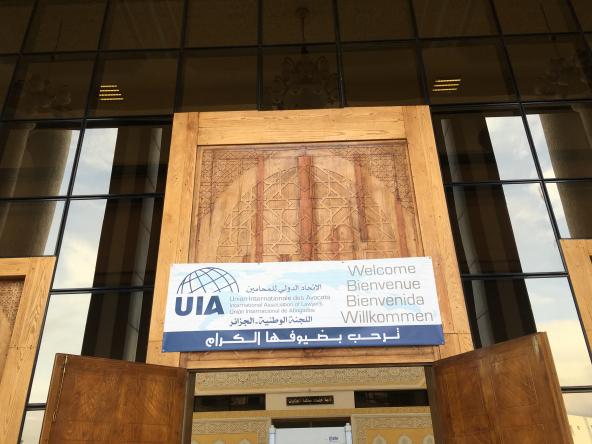
Article(s)
Algeria: it’s time to move from the moratorium to the abolition
By Florence Bellivier et Lorène du Crest, on 24 May 2017
Organized by the National Algerian Committee in partnership with the Boumerdes bar association, a seminar on the death penalty took place the 28th and 29th of April in Algeria. Gathering mainly academics, lawyers and representatives of the civil society, this seminar had the ambition to contribute to the “long process for the final abolition of the death penalty in Algeria”. The World Coalition Against the Death Penalty was represented by Florence Bellivier, Deputy Secretary General of the International Federation of the Leagues of Human Rights (FIDH).
2017
Algeria
Moratorium
Public Opinion

Article(s)
UN High Level Panel on the death penalty and limitation to the most serious crimes
By World coalition against the death penalty, on 14 March 2023
On February 28 2023, the United Nations (UN) Human Rights Council held its biennial high-level panel on the issue of the death penalty.
2023
Public Opinion
Document(s)
American Death Penalty Exceptionalism, Then and Now
By Jordan Steiker, California Western International Law Journal , on 1 February 2024
2024
Academic Article
United States
More details See the document
Published in October 2023.
The most commonly observed fact of American capital punishment is its present outlier status: the United States (U.S.) is the only developed Western democracy that retains the death penalty, and it does so not simply as a matter of law, but as a matter of practice, conducting numerous executions every year. This “exceptionalism” with respect to the death penalty is noteworthy, but focusing on present-day American retention obscures many additional aspects of American death penalty exceptionalism. This Keynote will trace several ways in which the American death penalty was an outlier at its founding and throughout its subsequent history, as well as the varied aspects of its exceptionalism today. I will conclude by predicting that U.S. exceptionalism will soon come to an end–with an “exceptional” form of death penalty abolition, traceable to the distinctive path of the American death penalty
- Document type Academic Article
- Countries list United States
Document(s)
Death Penalty in India – Annual Statistics Report 2021
By Project 39A, on 4 February 2022
2022
Academic report
India
More details See the document
Project 39A at the National Law University, Delhi published the sixth edition of the Death Penalty in India: Annual Statistics Report which provides an annual update on the use of the death penalty in India along with legislative and international developments on the issue. As on 31st December 2021, there were 488 prisoners on death row across India (a steep rise of nearly 21% from 2020), with Uttar Pradesh having the highest number at 86. This is the highest the death row population has been since 2004 as per the data from the Prison Statistics published by the National Crime Records Bureau.
- Document type Academic report
- Countries list India
Document(s)
2021 OHCHR Report on Deterrence: High-level panel discussion on the question of the death penalty
By Office of the High Commissioner for Human Rights (OHCHR), on 14 January 2022
2022
United Nations report
Public Opinion
aresfrruzh-hantMore details See the document
The present report is submitted pursuant to Human Rights Council resolutions 26/2 and 42/24. It provides a summary of the high-level panel discussion on the question of the death penalty held on 23 February 2021 at the forty-sixth session of the Council. The panel discussion addressed the human rights violations related to the use of the death penalty, in particular with respect to whether the use of the death penalty has a deterrent effect on crime rates.
- Document type United Nations report
- Themes list Public Opinion
- Available languages حلقة نقاش رف عة المستوى بشأن مسألة عقوبة الإعدامInforme de la OACDH 2021 sobre el efecto disuasorio : Mesa redonda de alto nivel sobre la cuestión de la pena de muerteRapport HCDH 2021 sur l'effet dissuasif : Réunion-débat de haut niveau sur la question de la peine de mortОбсуждение в рамках дискуссионной группы высокого уровня вопроса о смертной казни,способствует ли ее применение сдерживанию преступности2021年联合国威慑效应报告 - 关于死刑问题的高级别专题小组讨论会
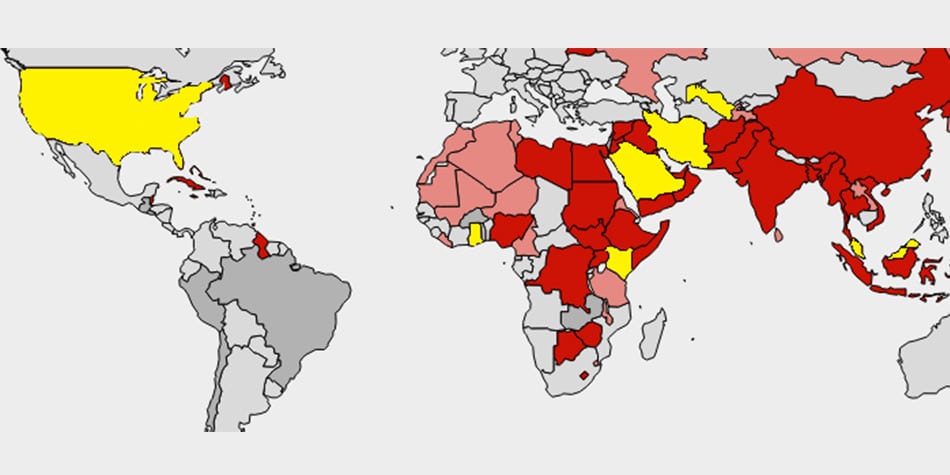
Article(s)
Mid-terms: A first half of 2023 marked by multiple abolitions
By Nellia Halimi, on 9 October 2023
The first seven months of 2023 have been rich for the abolitionist community with a new abolitionist country, a new abolitionist state in the United States, as well as progress for abolition within multiple countries. However, some countries continue to use the death penalty and there have been alarming increases in executions.
2023
Ghana
Iran (Islamic Republic of)
Kenya
Malaysia
Saudi Arabia
Singapore
Trend Towards Abolition
United States
Uzbekistan
Document(s)
2020 Activity Report
By World Coalition Against the Death Penalty, on 9 September 2021
2021
World Coalition
frMore details Download [ pdf - 496 Ko ]
Activity Report of the World Coalition Against the Death Penalty for 2020, as adopted by its General Assembly on 18 June 2021
- Document type World Coalition
- Available languages Rapport d'Activité 2020
Document(s)
Gender and Death Penalty Glossary
By World Coalition against the Death Penalty, on 1 August 2023
2023
World Coalition
Gender
frMore details Download [ pdf - 829 Ko ]
As part of the integration of a gender and intersectional approach into its strategy, the World Coalition Against the Death Penalty (World Coalition) decided to develop a glossary to identify and define the key terms of which the abolitionist movement should be aware to consider gender and other axes of intersectional discrimination at work in the capital punishment process, and more broadly to mainstream gender into their abolitionist work. This glossary was developed based on existing glossaries of World Coalition members on closely related topics, existing international definitions and standards established by international human rightsmechanisms as well as based on definitions written by international organizations specializing inwomen’s rights and LGBTQIA+ people’s rights.This glossary aims to support the abolitionist movement in recognizing the gender and intersectional biases at work in the judicial process leading to the death penalty and to contribute to the developmentof a common language around these issues, a process initiated a few years ago by members of theWorld Coalition Against such as the Cornell Center on the Death Penalty Worldwide. Moreover, this glossary also aims to promote the integration of a gender approach into the internal workings o fabolitionist organizations.
- Document type World Coalition
- Themes list Gender
- Available languages Glossaire Genre et Peine de mort
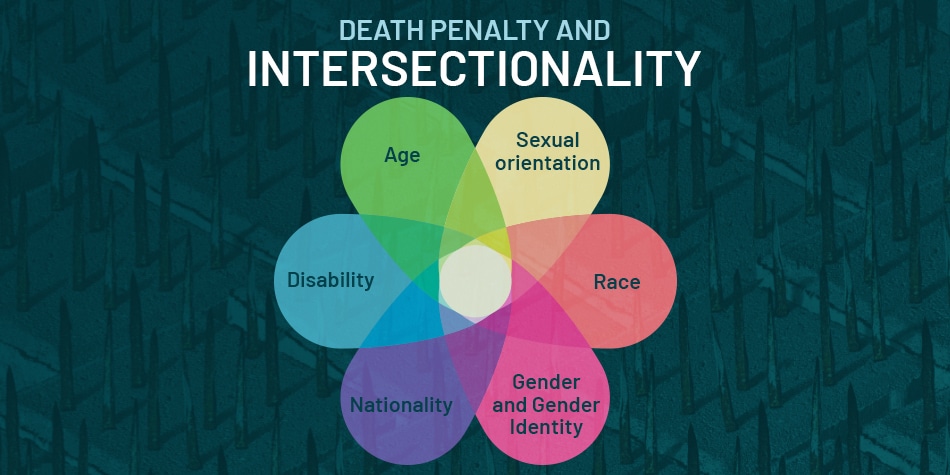
Article(s)
Joint statement on the death penalty and human rights of women and LGBTQIA+ individuals
By World Coalition Against the Death Penalty, on 10 October 2022
20th World Day against the Death Penalty On this 20th anniversary of the World Day Against the Death Penalty dedicated to the link between torture and the use of the death penalty and in continuation of the 2021 World Day Against the Death Penalty dedicated to women facing capital punishment, sentenced to death, executed, pardoned […]
2022
Cruel, Inhuman and Degrading Treatment and Punishment
Death Row Conditions
Fair Trial
Women
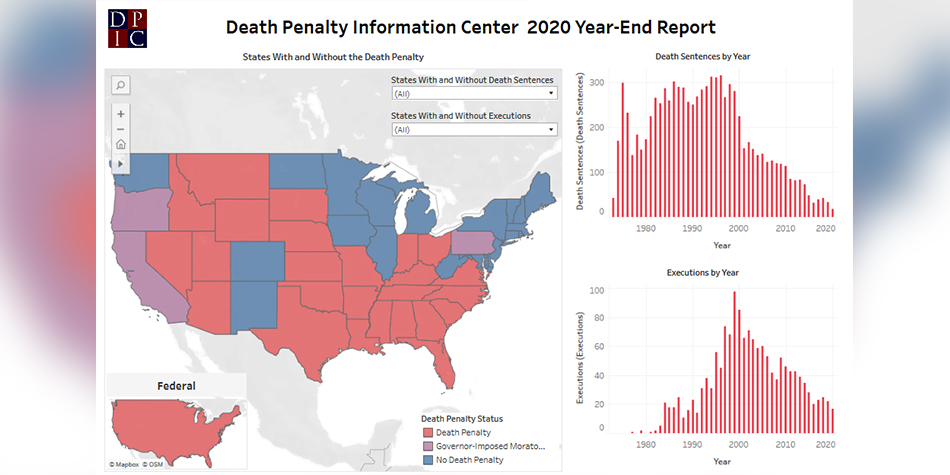
Article(s)
DPIC’s Report on the 2020 Death Penalty Usage in the US
By Louis Linel, on 6 January 2021
TheDeath Penalty Information Center’s 2020 annual report highlights the continuing trend toward abolition in the US and the resumption of federal executions in a challenging COVID-19 context.
2021
United States
Document(s)
Mobilization Kit World Day 2023
By World coalition against the death penalty, on 12 June 2023
2023
Campaigning
World Coalition
frMore details Download [ pdf - 864 Ko ]
For the 21th year in a row, the World Coalition Against the Death Penalty is calling for local initiatives and world-wide actions that shine a spotlight on the abolition of the death penalty. The goal of this Mobilization Kit is to inform of this year’s objectives as well provide ideas of activities that boost the global abolitionist goal. This year’s World Day is dedicated to people who, during the process of being sentenced to death, or following the sentence of their death, have been victims of torture.
- Document type Campaigning / World Coalition
- Available languages Kit de mobilisation Journée mondiale 2023
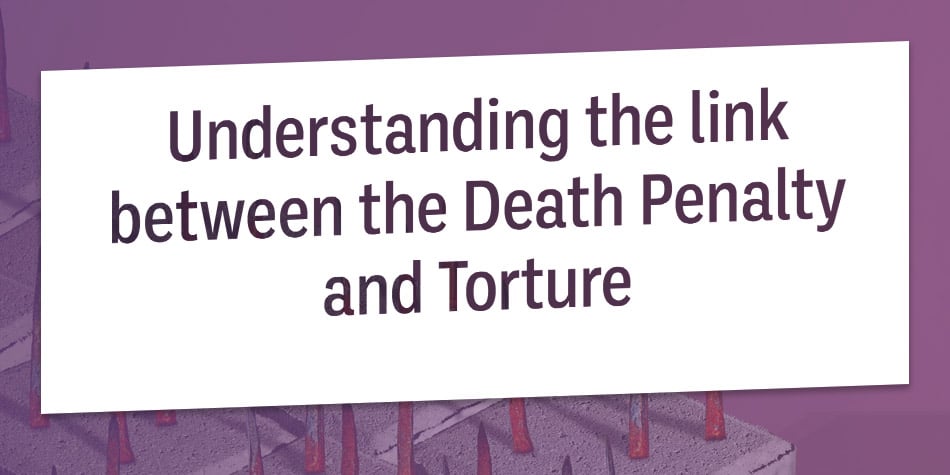
Article(s)
International Day in Support of Victims of Torture: Understanding the link between the Death Penalty and Torture
By Wendy Adouki, on 26 June 2023
Today, 26th June 2023, the world is commemorating the International Day in Support of Victims of Torture (International Day). Started in 1987, this International Day began when the United Nations Convention Against Torture and Other Cruel, Inhuman or Degrading Treatment or Punishment (UN Convention Against Torture) came into force; a crucial legal text to combat […]
2023
Cruel, Inhuman and Degrading Treatment and Punishment
Death Row Conditions
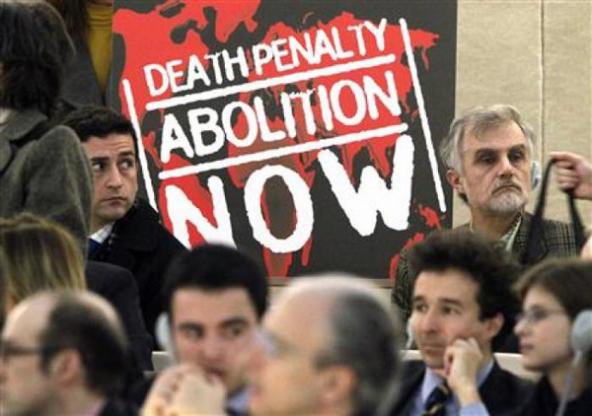
Article(s)
A challenge to the abolitionist movement
By Sandra Babcock, on 16 December 2011
Over the last few decades, we have made great strides toward the universal abolition of the death penalty. Nevertheless, despite the progress we have made, the death penalty remains entrenched in a significant number of states. And even in those nations that have refrained from carrying out executions in a sort of de facto moratorium, […]
2011
Intellectual Disability
Malawi
Mental Illness
Mexico
Moratorium
United States
Document(s)
Uganda – Universal Periodic Review – Death Penalty – July 2021
on 21 July 2021
2021
NGO report
World Coalition
Uganda
More details Download [ pdf - 336 Ko ]
This report addresses Uganda’s compliance with its international human rights obligations with respect to the death penalty. The report examines and discusses the current state of the death penalty in Uganda, including (1) the broad scope of crimes that are eligible for the death penalty; (2) the lack of effective access to counsel in capital cases; (3) the occurrence of extrajudicial killings.
This report recommends that Uganda adopt a number of key steps to better align its death penalty practices with Uganda’s international human rights obligations. These steps include the following: establishing an official, de jure moratorium on the death penalty; reducing the number and scope of crimes that are eligible for the death penalty; reducing the maximum possible sentence from death to one that is fair, proportionate and in compliance with international human rights standards; and other measures
- Document type NGO report / World Coalition
- Countries list Uganda
Document(s)
Efforts towards abolition of the death penalty: Challenges and prospects
By Death Penalty Research Unit (DPRU), University of Oxford, on 5 February 2024
2024
Academic Article
Trend Towards Abolition
More details See the document
Published in December 2023.
This paper reflects on the role of international human rights treaties in promoting universal abolition and progressive restriction of the death penalty. It suggests that over the past quarter of a century a ‘new human rights dynamic’ has aimed to generate universal acceptance that however it is administered, the death penalty violates the human rights of all citizens exposed to it. Nevertheless, defences of capital punishment based on principles of national sovereignty are engrained in some parts of the world, particularly in Asia and the Middle East. The human rights project struggles to make inroads into such jurisdictions where political will is opposed to abolition, and trenchant protection of sovereignty threatens the very universality of these rights.
- Document type Academic Article
- Themes list Trend Towards Abolition
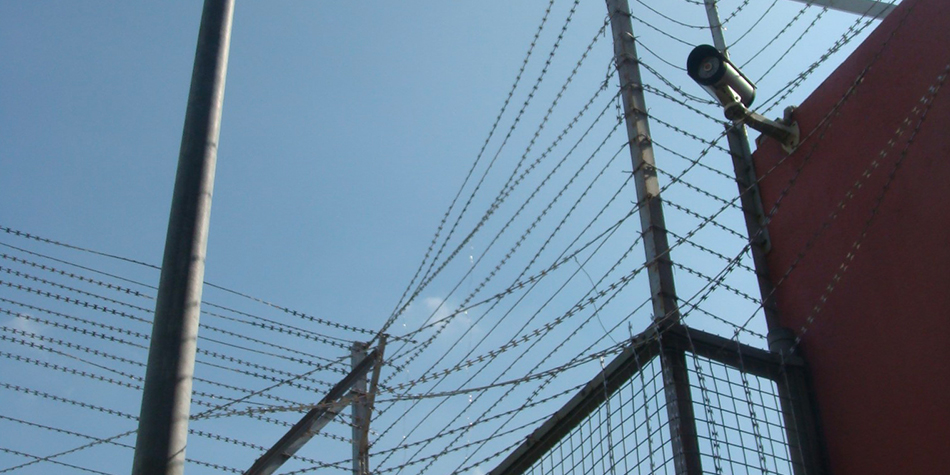
Article(s)
Does one year of “double zero” mean the death penalty has been repealed? How close is Taiwan to abolishing capital punishment?
By Lin Hsin-yi, Executive Director of the Taiwan Alliance to End the Death Penalty, on 28 April 2022
After the end of the last workday of 2021, it became clear that no one would be sentenced to death or executed that year – the first time ever that Taiwan has experienced “double-zero.”
2022
Taiwan

Article(s)
Despite recent setbacks, the trend towards the universal abolition towards the death penalty remains
By Elise Guillot, on 8 February 2017
The UK-All Party Parliamentary Group on the Abolition of the Death Penalty organised a meeting in London, on 25 January 2017. Gathering parliamentarians, representatives of the British institutions as well as members of the civil society, the meeting aimed at presenting the worldwide death penalty situation and at focusing on the countries at risk of reintroducing the death penalty.
2017
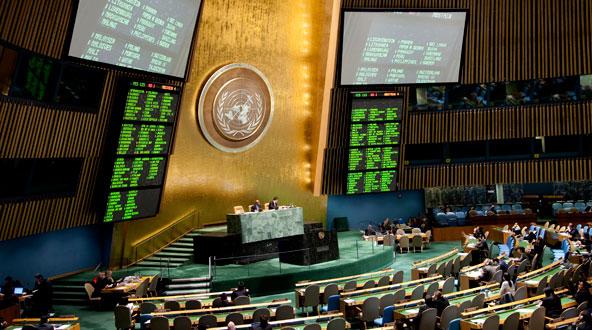
Article(s)
How to work with international bodies?
By Maria Donatelli, on 10 June 2013
The World Coalition is taking part in a workshop on mutual work relationships between international organisations and civil society at the 5th World Congress Against the Death Penalty. Here are tips for activists who would like to work with UN and regional bodies.
2013
Document(s)
Migratory dependency and the death penalty: Foreign nationals facing capital punishment in the Gulf
By Lucy Harry, Carolyn Hoyle , and Jocelyn Hutton Death Penalty Research Unit, Centre for Criminology, University of Oxford, on 30 January 2024
2024
Academic Article
Jordan
Kuwait
Lebanon
Qatar
Saudi Arabia
United Arab Emirates
More details See the document
Published on July 2, 2023
This article focuses on the cases of 664 foreign nationals, the majority of whom are migrant workers, under sentence of death across the Gulf states (including Jordan and Lebanon) between 2016 and 2021. The features of these cases suggest that they are inextricably linked to migrant workers’ dependency under the kafala system, with examples of migrants duped into smuggling drugs across the border by their migrant broker, and once in country, accounts of violent altercations due to disputes about exit visas, and in the case of migrant domestic workers, self-defence against sexual violence. Engaging with the burgeoning literature on immigration, exploitation and criminalisation, as well as scholarship on capital punishment, this article will explore the multiple and unique layers of dependency fostered by the kafala system that place migrant workers at higher risk of the death penalty in these Gulf jurisdictions.
- Document type Academic Article
- Countries list Jordan / Kuwait / Lebanon / Qatar / Saudi Arabia / United Arab Emirates
Page(s)
Presentation & History
on 22 June 2020
Mobilizing for Universal Abolition The World Coalition Against the Death Penalty, an alliance of more than 160 NGOs, bar associations, local authorities and unions, was created in Rome on 13 May 2002. It was created as a result of the commitment made by the signatories of the Final Declaration of the 1st World Congress Against […]
2020

Article(s)
Reflecting on the links between the death penalty and gender-based violence
By World Coalition Against the Death Penalty, on 25 November 2022
On 25 November 2022, International Day for the Elimination of Violence against Women, the World Coalition Against the Death Penalty, through the testimony of representatives of abolitionist member and partner organizations, wishes to raise awareness of the links between the death penalty and violence against women and gender minorities and call out the unjust and […]
2022
Gender
Kenya
Sri Lanka
Uganda
Women
Document(s)
Mobilization Kit 2010
By World Coalition against the death penalty , on 10 October 2010
2010
Campaigning
Trend Towards Abolition
More details Download [ pdf - 138 Ko ]
Every year, the World Coalition Against the Death
Penalty (WCADP) calls for local initiatives worldwide.
The events involve citizens and organisations
supporting the abolition of capital punishment and
comprise debates, concerts, press releases or any
other action which would give the global abolition claim
an international boost.
This Day is aimed at both political leaders and public
opinion in countries where the death penalty has or
has not yet been abolished: people have to remember
the meaning of abolition and pass it down through the
generations.
They must be aware that justice without the death
penalty is possible
- Document type Campaigning
- Themes list Trend Towards Abolition
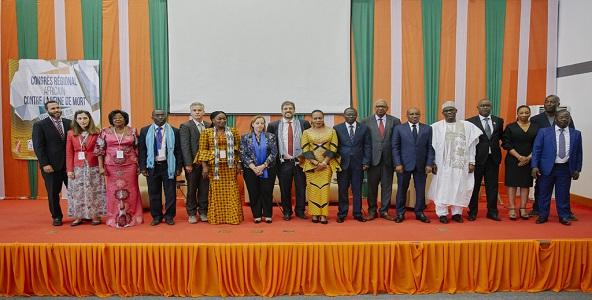
Article(s)
“It’s in Africa that we find the strongest dynamics towards abolition”
By Clémentine Etienne, on 24 April 2018
The third regional Congress against the death penalty was held in Côte d’Ivoire, in Abidjan, in 2018 from April 9 to 10th. This is a natural choice when one can know that Africa is named “next abolitionist continent” and that civil society recognized it as such.
2018
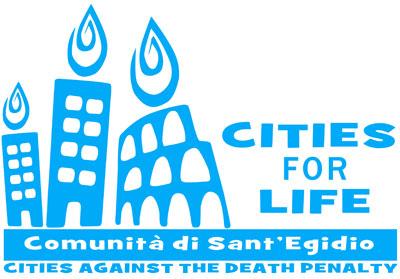
Article(s)
Cities for Life 2016: Let’s stay vigilant
By Emmanuel Trépied, on 19 December 2016
On 30 November, the International Day of “Cities for Life” was celebrated around the world. An opportunity to raise awareness among the civil society on the universal abolition.
2016
Public Opinion
Document(s)
2021 World Day Report
on 10 June 2022
2022
World Coalition
Women
frMore details Download [ pdf - 4154 Ko ]
On 10 October 2021, the World Coalition and abolitionists around the world celebrated the 19th World Day Against the Death Penalty (‘World Day’). Every year on World Day, the World Coalition highlights one problematic aspect of the Death Penalty. In 2021, the World Day explored the theme “Women sentenced to death, an invisible reality” to raise awareness on how the treatment of gender and gender-based inequalities create particularly precarious conditions for women sentenced to capital punishment. This report presents the activities organised for the 19th World Day and the media coverage it received.
- Document type World Coalition
- Themes list Women
- Available languages Rapport journée mondiale 2021
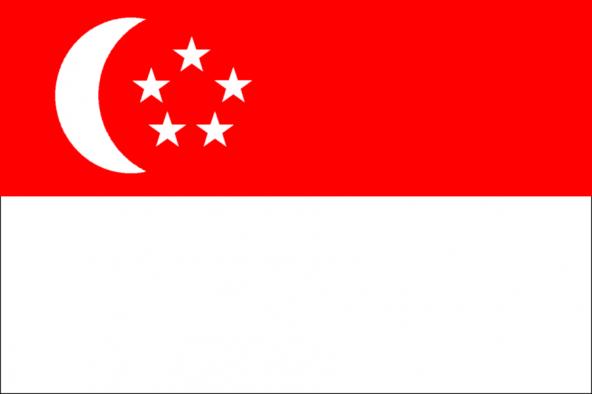
Article(s)
Singapore: the government threatens abolitionists and human rights defenders.
By Thalia Gerzso, on 24 January 2018
Despite a death penalty reform in 2013, Singapore continues to impose the mandatory death penalty in a significant number of cases while repressing abolitionists and human rights defenders.
2018
Singapore

Member(s)
Association Justice et Miséricorde (AJEM)
on 30 April 2020
The Association Justice and Mercy (AJEM) is a Lebanese nonprofit, nonpolitical and nonsectarian nongovernmental organization (NGO) created in 1996 at the initiative of a group of social workers. AJEM deals mainly with the right of prisoners in Lebanon, and more generally with human rights, the fight against torture and other cruel, inhuman and degrading treatment, […]
2020
Lebanon
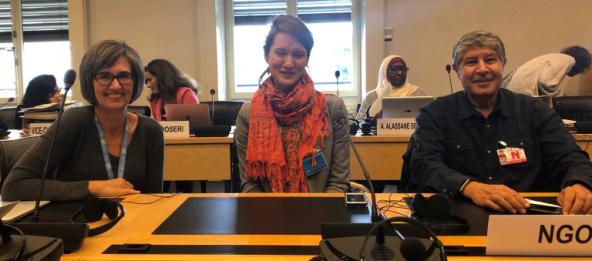
Article(s)
The Rights of Children Whose Parents Are Sentenced to Death – The Case of Tunisia
By Lisa Borden, volunteer with The Advocates for Human Rights, on 30 October 2019
I joined Bronwyn Dudley of the World Coalition Against the Death Penalty, and Choukri Latif of the Coalition tunissiene contre la peine de mort (a Tunisian anti-death penalty NGO), to address the committee regarding Tunisia’s failure to implement the rights of children whose parents have been sentenced to death or were executed.
2019
Juveniles
Tunisia

Article(s)
The 8th World Congress reaffirms the importance of gender-based discussions
By World Coalition Against the Death Penalty, on 16 December 2022
The 19th World Day Against the Death Penalty highlighted the intersectional discrimination that women face in the judicial process leading to the death penalty, making visible one facet of the links between the death penalty and gender discrimination.
2022
Gender
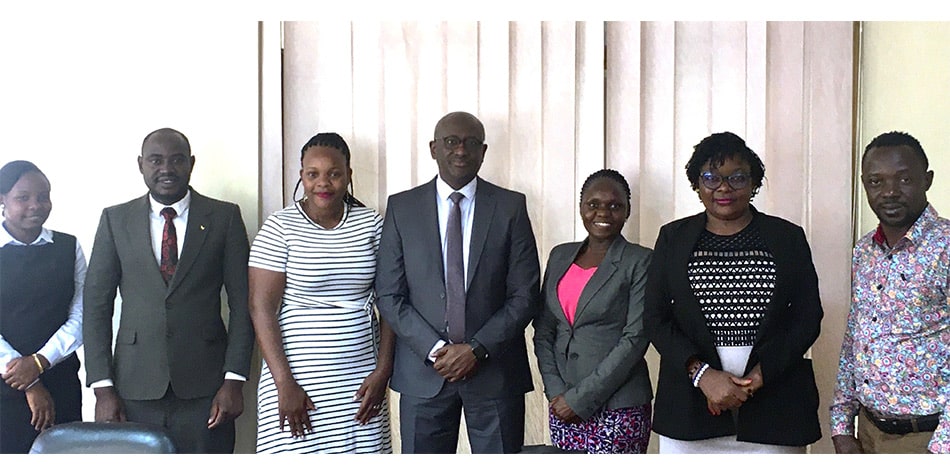
Article(s)
Abolition in Africa- 77th Ordinary Session of the African Commission on Human and Peoples’ Rights
By Yasin Sentumbwe Munagomba and Bronwyn Dudley, on 12 January 2024
The ACHPR (African Commission on Human and Peoples’ Rights) 77th Public Ordinary Session was held in Arusha, Tanzania from 20 October – 9 November 2023.
2024
Gender
Trend Towards Abolition
Uganda
United Republic of Tanzania
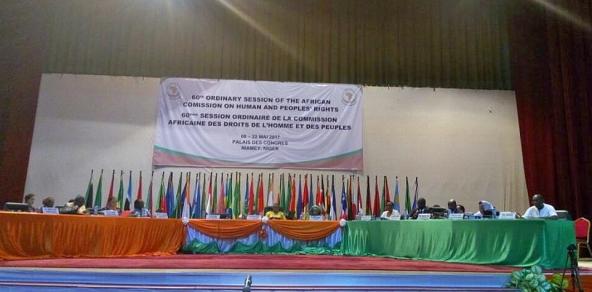
Article(s)
A major abolitionist gathering for the 60th ordinary session of the African Commission on Human and People’s Rights in Niger
By Jessica Corredor, on 19 May 2017
The work of the 60th ordinary sessions of the African Commission on Human and People’s Rights (ACHPR) took place in Niger between the 8th and the 22th of May. Invited by SYNAFEN, one of its members, the World Coalition took this opportunity to gather in the margins of the ACHPR session.
2017
Niger
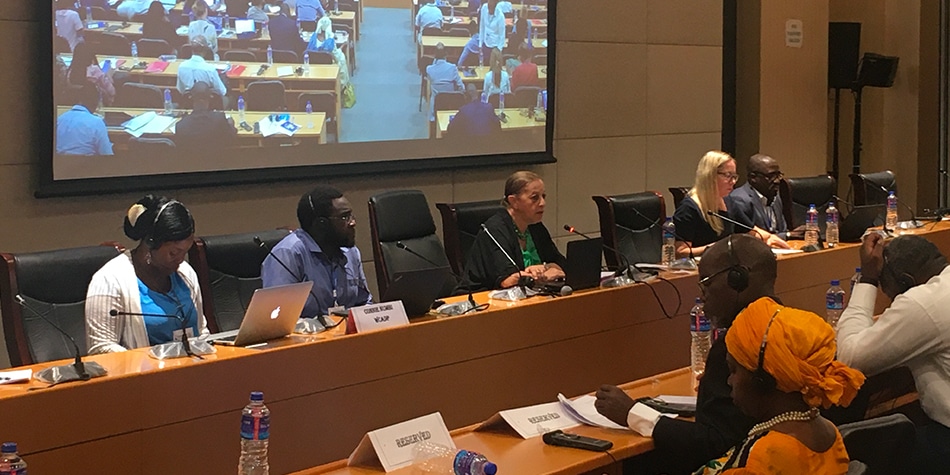
Article(s)
73rd Ordinary Session of the African Commission of Human and Peoples’ Rights: In- Person, Advocating Against the Death Penalty
By Bronwyn Dudley & Connie Numbi, on 16 December 2022
After nearly 3 years, the ACHPR (African Commission on Human and Peoples’ Rights) met in-person in Banjul, The Gambia to hold their 73rd Ordinary Session from 21st October – 10th November 2022.
2022
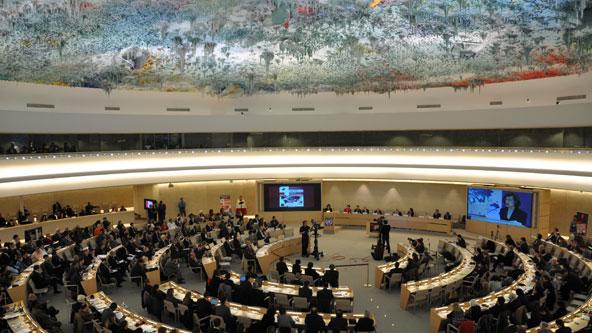
Article(s)
Discussion at the Human Rights Council of human rights violations related to the use of the death penalty
By Jessica Corredor, on 7 March 2017
From Zeid Ra’ad Al Hussein, United Nations High Commissioner for Human Rights, to abolitionist and retentionist government representatives and World Coalition members, participants to the Biennial high-level discussion on death penalty exchanged views in order to address human rights violations related to the use of the death penalty, in particular with respect to the prohibition of torture.
2017
Cruel, Inhuman and Degrading Treatment and Punishment
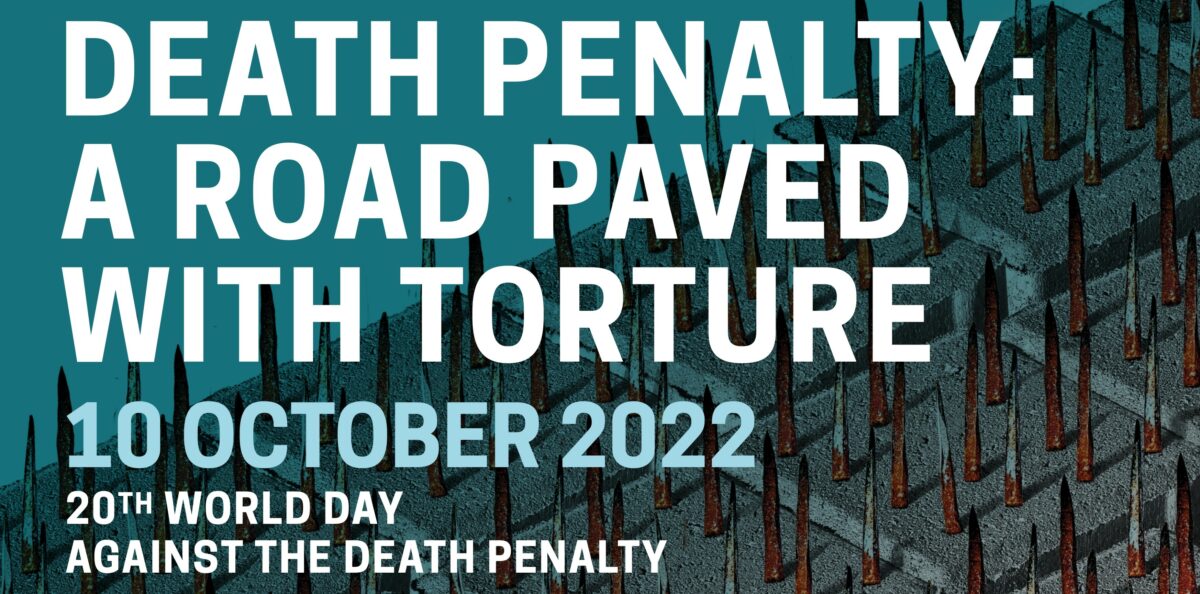
Article(s)
A Look Back at the 20th Anniversary of the World Day Against the Death Penalty
By Dunia Schaffa, on 27 January 2023
“Psychologically I am no longer human.”. This tweet by the World Organization Against Torture, quoting an interview with Richard Yav, a former security guard who was wrongly sentenced to death for 20 years in Benin, sheds light on the various impacts of torture.
2023
Cruel, Inhuman and Degrading Treatment and Punishment
Death Row Conditions
Document(s)
How to Insert Gender issues in Abolitionist Advocacy?
By World Coalition against the Death Penalty, on 1 August 2023
2023
Lobbying
Gender
frMore details Download [ pdf - 710 Ko ]
This tool was developed by the World Coalition Against the Death Penalty (World Coalition) in partnership with the Advocates for Human Rights (TAHR), after noting the limited integration of gender issues into the abolitionist advocacy of the World Coalition’s member organizations. This tool has also been edited and enrichened by the World Coalition’s Gender Working Group.
As part of the “Leave No Woman Behind on Death Row” project, this tool aims to assist World Coalition members and partners in implementing gender-sensitive abolitionist advocacy.
In this document, intended to be a practical tool, guidance is provided on how to incorporate gender-specific recommendations into abolitionist advocacy with human rights bodies. This tool focuses recommendations made by civil society organizations (CSOs) to international and regional human rights bodies, intended to encourage national authorities to act in a certain way. Human rights mechanisms and bodies serve as crucial actors in legitimizing and supporting CSOs work on the ground. A recommendation made by a CSO can, in turn, be accepted by a human rights special mechanism and be transformed into an official recommendation to the State. From there, CSOs can continue to use this official recommendation in their national advocacy to strengthen their claim and position, fulfilling a virtuous circle in advocacy work.
In this document, the recommendations made are done pending full abolition of the death penalty. They are seen as transitional steps towards full abolition of the death penalty in law and in practice.
This tool is divided into two sections. The first part focuses on how to increase visibility of the discrimination faced by women in the judicial process leading to the death penalty. The second part focuses on the discrimination faced by LGBTQIA+ people during the same judicial process. In both sections, definitions are provided as well as background information in order to understand the issues at stake in each of the themes.
- Document type Lobbying
- Themes list Gender
- Available languages Comment insérer les questions de genre dans le plaidoyer abolitionniste ?
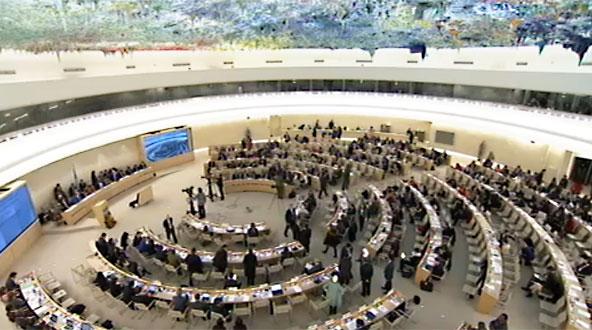
Article(s)
Top UN representatives take stance on death penalty at Human Rights Council
By World Coalition Against the Death Penalty, on 14 March 2014
From UN Secretary General Ban Ki-moon to abolitionist and retentionist government ministers and World Coalition members, participants to a recent discussion on the death penalty placed the issue high on the international agenda.
2014
Afghanistan
Benin
Brazil
Cruel, Inhuman and Degrading Treatment and Punishment
Iran (Islamic Republic of)
Mongolia
Morocco
Myanmar
Namibia
Pakistan
Saudi Arabia
Sierra Leone
Singapore
Sudan
United States
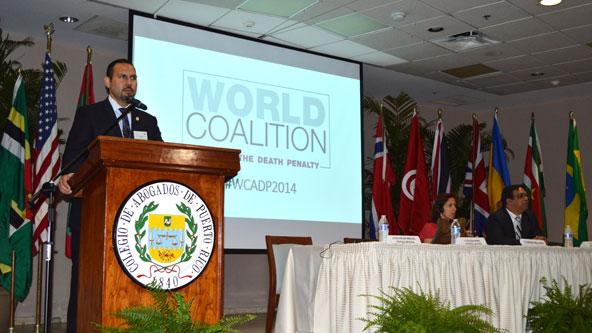
Article(s)
AGM focuses on mental health and progress in the Caribbean
By Inès Oulmokhtar, on 16 May 2014
The World Coalition is holding its General Assembly between 20-22 June in San Juan, Puerto Rico and invites the public to take part in the event.
2014
Puerto Rico
Document(s)
Detailed Factsheet – World Day 2022
By the World Coalition Against the Death Penalty, on 4 July 2022
2022
World Coalition
frMore details Download [ pdf - 893 Ko ]
Detailed factsheet on torture and the death penalty, for the 20th World Day Against the Death Penalty (2022).
- Document type World Coalition
- Available languages Fiche détaillée - Journée mondiale 2022
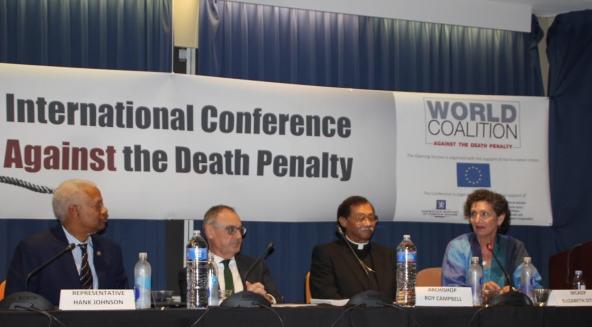
Article(s)
International Conference Against the Death Penalty: abolistionists are united and determined
By Lorène du Crest, on 18 July 2017
The World Coalition Against the Death Penalty celebrated its 15th anniversary with an International Conference and its General Assembly on 22-24 June in Washington DC.
2017
Document(s)
MOBILIZATION KIT World Day Against the Death Penalty 2024 – 2025 Security and the death penalty
By World coalition against the death penalty, on 12 June 2024
2024
Campaigning
World Coalition
frMore details Download [ pdf - 2534 Ko ]
- Document type Campaigning / World Coalition
- Available languages KIT DE MOBILISATION Journée mondiale contre la peine de mort 2024 - 2025 Sécurité et peine de mort
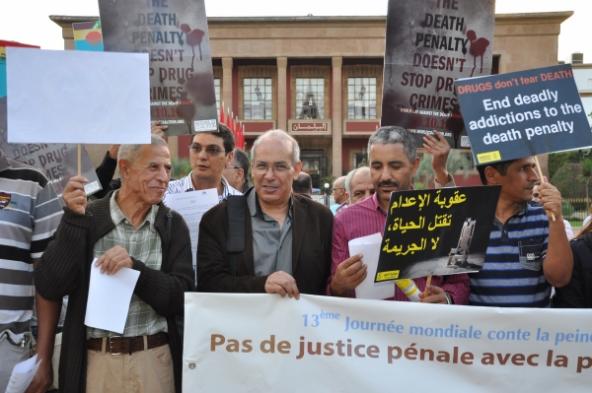
Article(s)
Morocco is working to break down the political barriers to the abolition of the death penalty
By Tiziana Trotta, on 26 October 2015
The Moroccan Coalition Against the Death Penalty organized numerous meetings and events in different regions of the country in October on the occasion of the 13th World Day.
2015
Morocco
Document(s)
Mobilization Kit World Day 2022
By the World Coalition Against the Death Penalty, on 9 June 2022
2022
World Coalition
frMore details Download [ pdf - 892 Ko ]
For the 20th year in a row, the World Coalition Against the Death Penalty is calling for local initiatives and world-wide actions that shine a spotlight on the abolition of the death penalty. The goal of this Mobilization Kit is to inform of this year’s objectives as well provide ideas of activities that boost the global abolitionist goal. This year’s World Day is dedicated to people who, during the process of being sentenced to death, or following the sentence of their death, have been victims of torture.
- Document type World Coalition
- Available languages Kit de mobilisation Journée mondiale 2022
Document(s)
Death by Design: Part 1
By The Wren Collective , on 23 January 2024
2024
NGO report
Legal Representation
United States
More details See the document
Published in December 2023.
In “Death by Design” Parts 1 and 2, Wren investigated the state of court-appointed capital representation in Harris County—the death penalty capital of the world.The first report delves into the failings of the lawyers in capital cases.
Wren recommends a total overhaul to the system of capital representation for poor defendants in Harris County, with either the public defender absorbing those cases or the judges establishing a new, freestanding capital public defender that is independent from judicial oversight.
- Document type NGO report
- Countries list United States
- Themes list Legal Representation
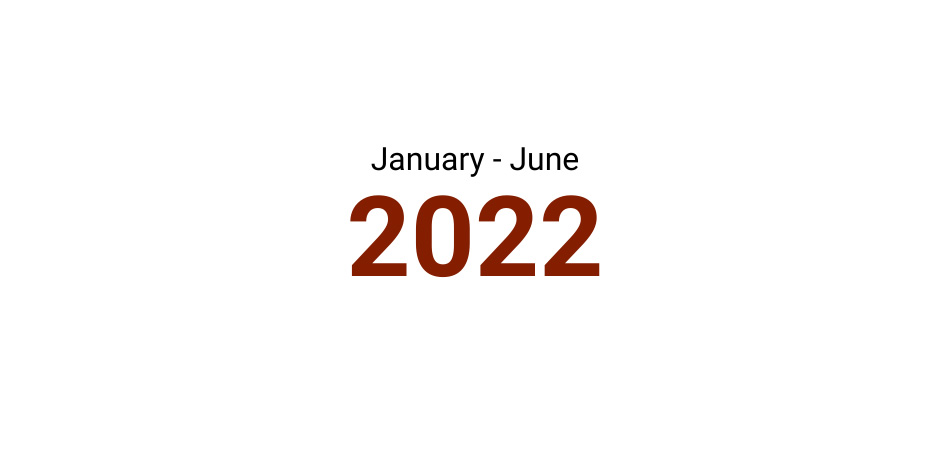
Article(s)
Mid-terms: A first half of 2022 rich in abolitions
By the World Coalition Against the Death Penalty, on 13 September 2022
The first six months of 2022 have been rich for the abolitionist community with two new abolitionist countries and a new ratification of the Second Optional Protocol to the International Covenant on Civil and Political Rights aiming at the abolition of the death penalty. However, some countries continue to use the death penalty and there […]
2022
Document(s)
World Psychiatric Association position statement mental health and the death penalty
By World Psychiatric Association, on 30 November 2023
2023
Arguments against the death penalty
Fair Trial
Intellectual Disability
zh-hantMore details See the document
International law and laws of various countries prohibit the imposition of the death penalty on persons
with mental illness or developmental and intellectual disabilities due to the special barriers faced by
them in defending themselves; their limited moral culpability; and their diminished ability to
understand the nature and reason for their execution. However, due to lack of accommodations in
criminal proceedings and legal safeguards, persons with mental illness, developmental and intellectual
disabilities are at a greater risk of being sentenced to death and having their fair trial rights denied.
Authors:
Maitreyi Misra, Director (Mental Health and Criminal Justice), Project 39A, National Law University
Delhi.
Namrata Sinha, Research Associate (Mental Health and Criminal Justice), Project 39A, National Law
University Delhi.
Neeraj Gill, Professor, Health Research Institute, University of Canberra and Griffith University,
School of Medicine, Griffith University, Gold Coast, Australia.
Soumitra Pathare, Consultant Psychiatrist, Director, Centre for Mental Health Law and Policy, ILS
Law College, Pune.
Afzal Javed, President, World Psychiatric Association.
- Document type Arguments against the death penalty
- Themes list Fair Trial / Intellectual Disability
- Available languages 世界精神醫學會針對精神健康與死刑之立場聲明
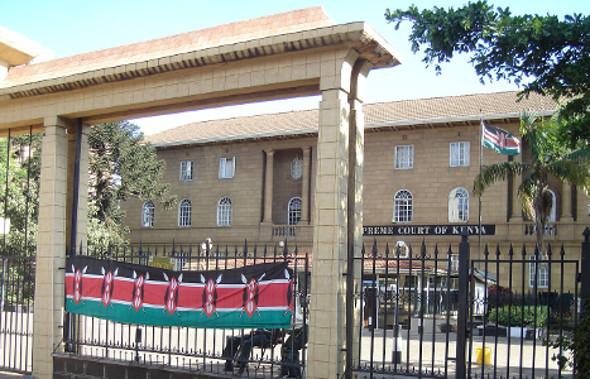
Article(s)
The Supreme Court of Kenya declares the mandatory death penalty unconstitutional
By Thalia Gerzso, on 23 January 2018
On December 14, 2017, the Supreme Court of Kenya declared the mandatory death penalty unconstitutional. This landmark decision puts an end to several years of uncertainties and constitutes an additional step towards the abolition of the death penalty in the country.
2018
Kenya
Document(s)
TESTIMONIES- 21 st World Day Against the Death Penalty
on 10 July 2023
2023
Campaigning
World Coalition
frMore details Download [ pdf - 759 Ko ]
This document has been compiled by the Secretariat of the World Coalition Against the Death Penalty with substantial aid from member organizations, including Abdorrahman Boroumand Center, Amnesty International, Cornell Center on the Death Penalty Worldwide, Free Mumia ! French Support Group (Collectif français “Libérons Mumia !”), German Coalition Against the Death Penalty, Justice Project Pakistan, […]
- Document type Campaigning / World Coalition
- Available languages TEMOIGNAGES - 21ème Journée mondiale contre la peine de mort

Article(s)
Bahrain: Joint appeal for commutation and moratorium
By Salam for Democracy and Human Rights, on 13 January 2022
Joint Appeal was published on World Day Against the Death Penlaty on 10 October 2021 and sent to the Bahraini Embassy in France, UK and Switzerland.
2022
Bahrain
Clemency
Moratorium
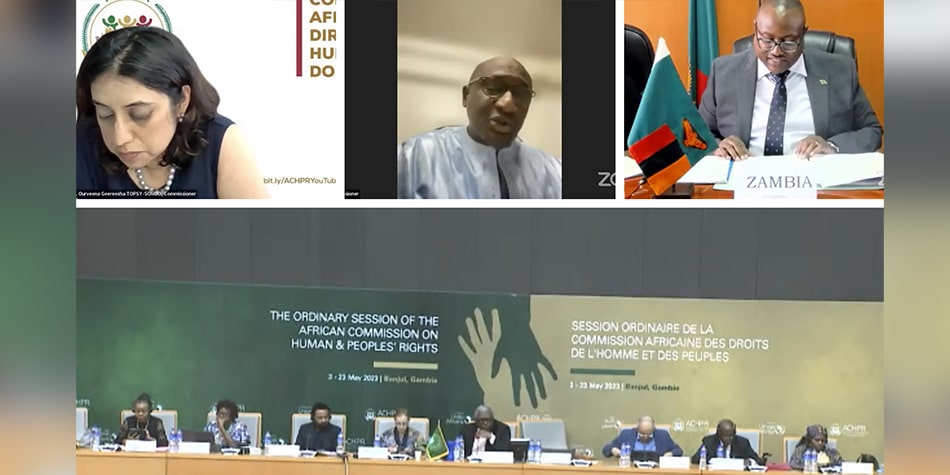
Article(s)
75th Ordinary Session of the African Commission of Human and Peoples’ Rights
By Wendy Adouki, World Coalition Against the Death Penalty, on 15 August 2023
From 3rd to 23rd May 2023, the African Commission on Human and Peoples’ Rights (ACHPR) held its 75th Ordinary Session for the first time in a hybrid format with participants both attending online and in person in Banjul, the Gambia, seat of the ACHPR.
2023
Trend Towards Abolition
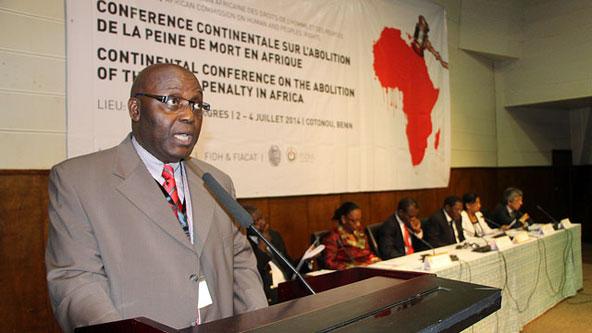
Article(s)
African leaders and abolitionists hold anti-death penalty summit in Cotonou
By World Coalition Against the Death Penalty, on 7 July 2014
The signature of an African treaty on the abolition of the death penalty is a priority to firm up the trend moving away from capital punishment across the continent.
2014
Benin
Benin
Public Opinion
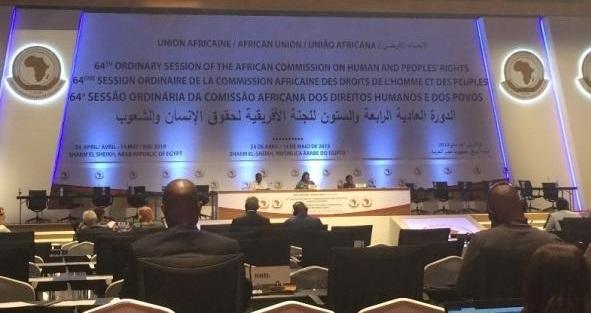
Article(s)
64th ACHPR Session: Concluding in Egypt, Where Sentences & Executions are on the Rise
By Bronwyn Dudley, on 14 May 2019
The 64th Ordinary Session of the African Commission on Human and People’s Rights (ACHPR) is concluding in Sharm-el-Sheikh, Egypt. The ACHPR, the African Union organ steadfast in promoting and protecting human rights on the African continent, held the session from 24 April – 14 May 2019. Despite holding official human right’s discussions in a country where sentencing and executions are on the rise, the abolitionist voice was still heard.
2019

Article(s)
Adoption of Bill Allowing the Imposition of the Death Penalty for a New Crime.
By Grace Keane O'Connor , on 30 April 2021
Philippine House Bill No. 7814 provides the death penalty for a new crime under the 2002 Comprehensive Dangerous Drugs Act.
2021
Drug Offenses
Philippines
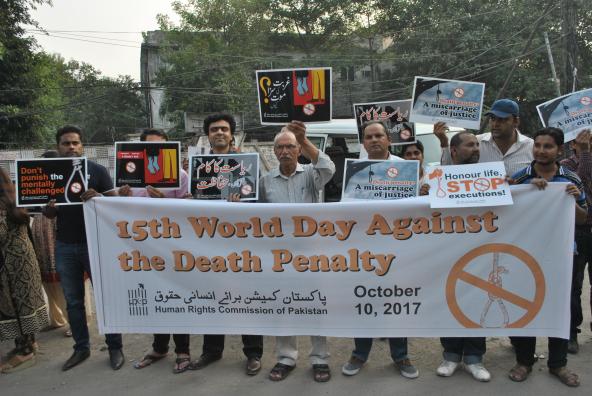
Article(s)
Abolitionists fight against the abusive use of the death penalty
By Thalia Gerzso, on 28 November 2017
In October 2017, Pakistan has agreed to initiate efforts to narrow down the scope of the death penalty. This first step is the result of a strong mobilization from Pakistani and international organizations, in particular during World Day.
2017
Pakistan
Public Opinion
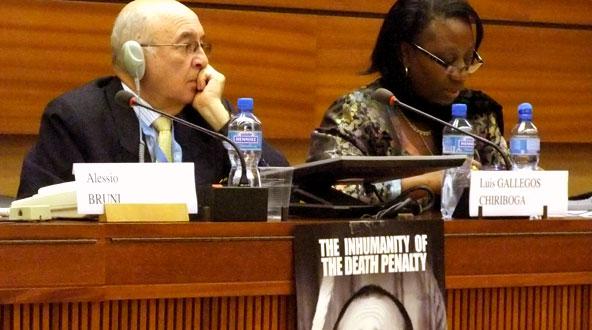
Article(s)
The great abolitionist event comes to the UN
By Aurélie Plaçais, on 17 October 2011
For the first time in nine years, the United Nations has participated in festivities marking the World Day Against the Death Penalty.
2011
Cruel, Inhuman and Degrading Treatment and Punishment
Death Row Conditions
Switzerland
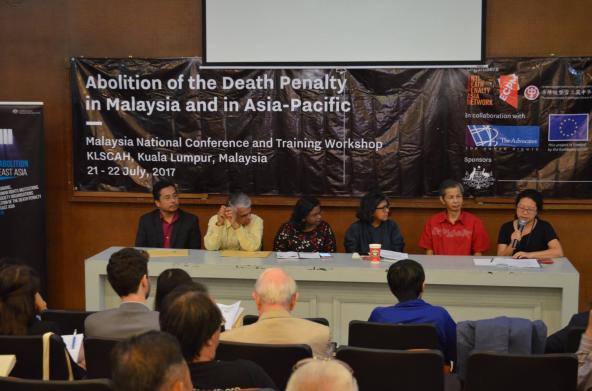
Article(s)
ADPAN network reinforces its strength in Asia
By Jessica Corredor, on 22 August 2017
The Anti-Death Penalty Asia Network held its third AGM in Kuala Lumpur, Malaysia on 20 July, followed by a national conference on the abolition of the death penalty in Malaysia and Asia-Pacific.
2017
Malaysia
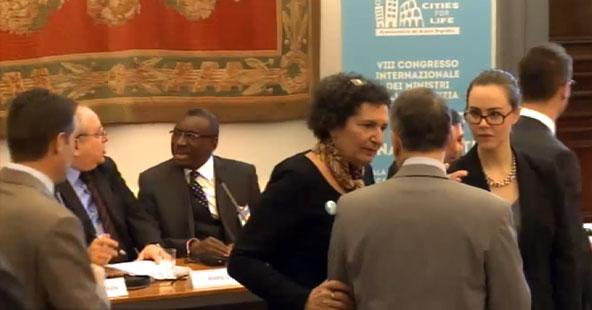
Article(s)
Justice ministers meet on the eve of Cities Against the Death Penalty
By Elizabeth Zitrin (World Coalition vice-president), in Rome, on 1 December 2013
More than 20 ministers of justice met in Rome for the annual conference on the abolition of the death penalty organised by the Community of Sant’Egidio and heard harrowing testimonies from courageous activists.
2013
Afghanistan
Belarus
Costa Rica
El Salvador
Italy
Philippines
Senegal
Switzerland
United States
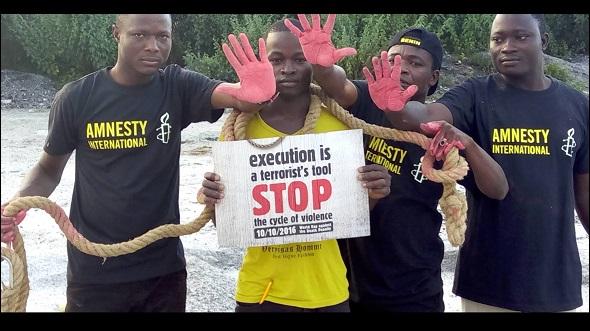
Article(s)
Africa raises its voice against the death penalty
By Tiziana Trotta, on 21 October 2016
Many African organizations and institutions raised their voices on the occasion of the 14th World Day against the Death Penalty, whose last edition, celebrated on October 10, was dedicated to the use of death penalty for terrorism-related crimes.
2016
Terrorism
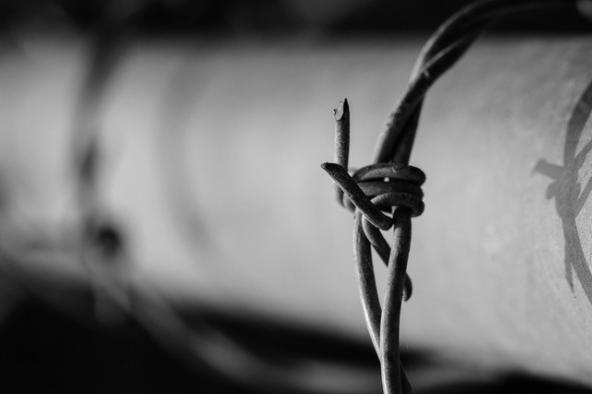
Article(s)
No mention of death row prisoners in Mandela rules
By Nordine Drici (Planète Réfugiés) & Sandrine Ageorges-Skinner (ECPM), on 30 November 2018
Commemorating the 70th anniversary of the Universal Declaration of Human Rights on 10 December 2018 is an opportunity to question the effectiveness of civil and political rights, but also economic, social and cultural rights, in the context of an increasingly globalized world that ostracizes, excludes, sentences to death and continues to execute.
2018
Death Row Conditions
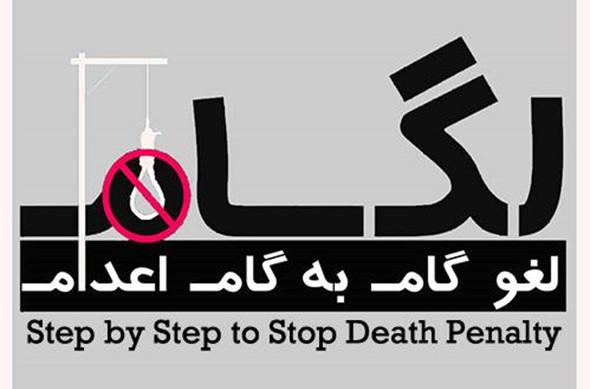
Article(s)
Iran’s brave human rights defenders and their struggle against the death penalty
By Amnesty International, on 5 March 2018
As the world moves away from the death penalty, Iran continues to execute hundreds of people every year and comes second only to China in the number of executions carried out annually. Amnesty International recorded nearly 1,000 executions in Iran in 2015 and at least 567 in 2016.
2018
Iran (Islamic Republic of)
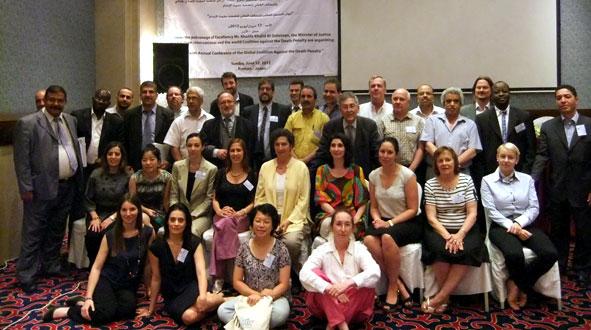
Article(s)
10 years, 132 members, 45 countries
By Florence Bellivier, on 30 June 2012
Penal Reform International welcomed the World Coalition Against the Death Penalty to celebrate its tenth anniversary in Jordan with support from Justice Minister Khalifa Al Sulaiman.
2012
Drug Offenses
Iran (Islamic Republic of)
Iraq
Jordan
Moratorium
Singapore
Taiwan
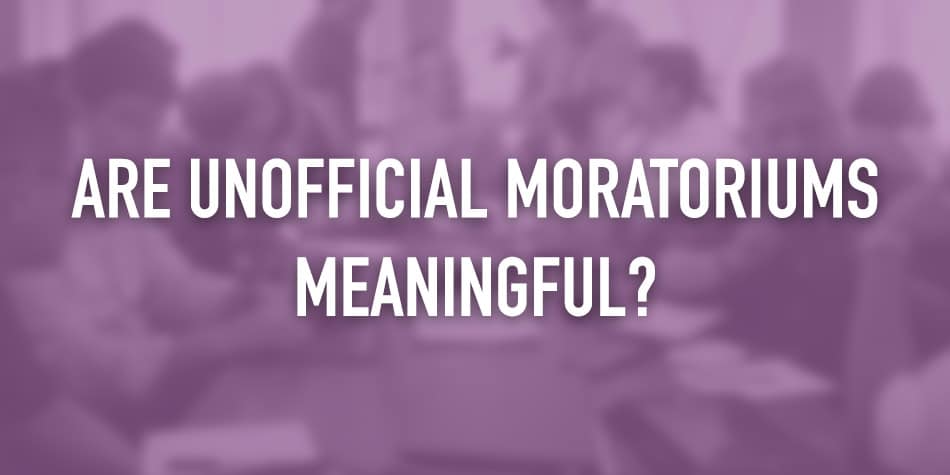
Article(s)
Importance of understanding phases of abolition: the danger of ‘abolitionist in practice’
By Venus Aves, Bronwyn Dudley, and Shahindha Ismail, on 6 November 2023
In July 2023, the World Coalition hosted a seminar in Malaysia in the context of its “Countries at Risk” project. This subject of informal moratoriums solicited much interest as participants considered preventative strategies for stopping a return to the death penalty, and what environmental factors need to be considered to implement those strategies. This article […]
2023
Moratorium
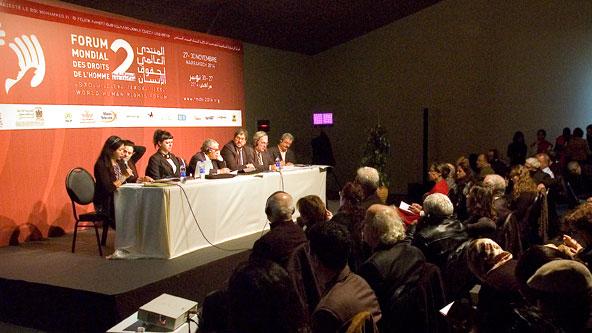
Article(s)
Morocco’s death penalty takes centre stage at Marrakesh forum
By Thomas Hubert (in Marrakesh, Morocco), on 28 November 2014
Debates on the abolition of the death penalty at the World Human Rights Forum have highlighted the situation in the host country among the major fronts in the abolitionist struggle.
2014
Morocco

Article(s)
The international responsibility of States
By Pierre Désert, on 25 June 2008
When a State ratifies a treaty, it undertakes to respect the undertakings that it has made before the whole of the international community. If it fails to meets its obligations and goes against the provisions of the treaty, it can be held responsible at international level.
2008
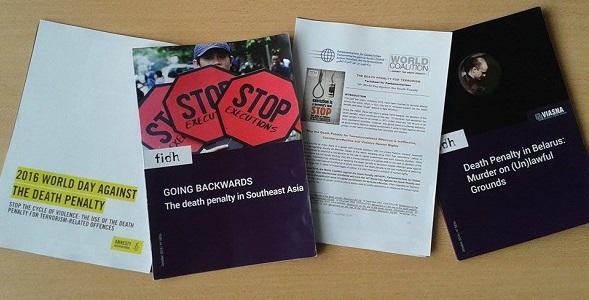
Article(s)
Eager to learn more about the death penalty? Abolitionist civil society around the world answered your call!
By Elise Guillot, on 8 November 2016
10 October saw the release of several publications and tools to raise awareness on the death penalty in all regions of the world. Take a look!
2016
Terrorism
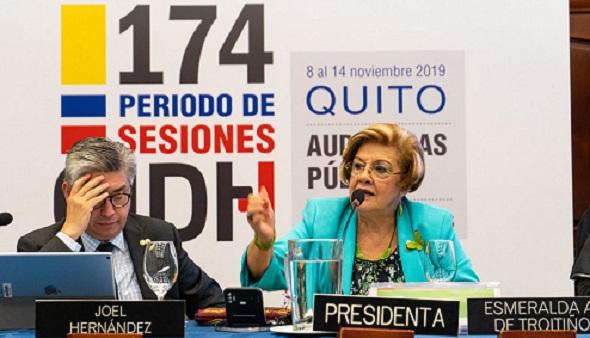
Article(s)
The Inter-American system commits to see the end of the death penalty
By World Coalition Against the Death Penalty, on 13 January 2020
In November 2019, Ecuador hosted a series of high level meetings of the Organisation of American States (OAS), including the Third Forum of the Inter-American Human Rights System and the 174th Period of Sessions of the Inter-American Commission on Human Rights (IACHR), during which abolition of the death penalty was on the agenda.
2020
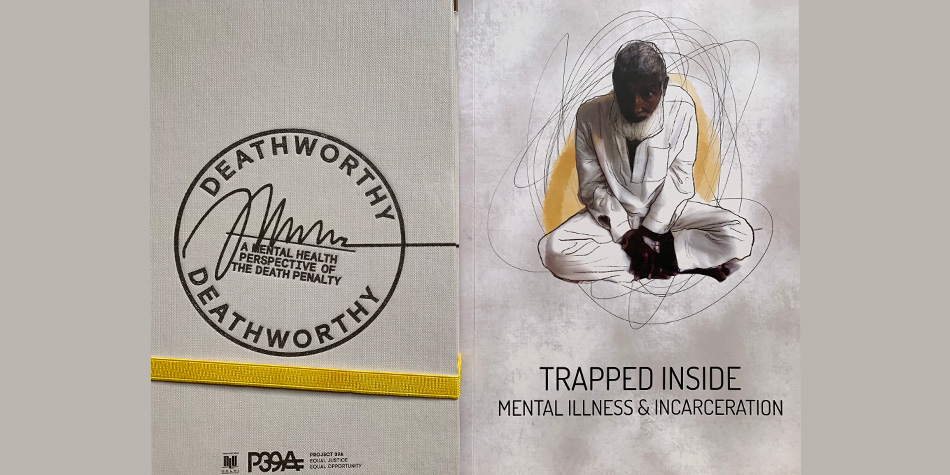
Article(s)
Over 8,000 people on death row in South Asia
By Aurelie Placais, staff, on 3 May 2022
With few executions but one of the biggest death rows in the world, South Asia is at a crossroad. Recent publications explore mental health on death row and social and economic background of people sentenced to death in Bangladesh, India, the Maldives, Pakistan and Sri Lanka.
2022
Bangladesh
Death Row Conditions
India
Maldives
Mental Illness
Pakistan
Sri Lanka
Document(s)
The Physician in the Execution Chamber: No Such Thing as the Normal Pain of Dying
By Joel Zivot, California Western International Law Journal , on 1 February 2024
2024
Academic Article
United States
More details See the document
Published in October 2023.
For capital punishment to be lawful in the United States of America, it must occur without cruelty, a requirement of the traditional reading of the Eighth Amendment. There has never been a consensus on what form of execution is cruel, although some historic practices are shockingly barbaric to modern sensibilities— I think of the “draw and quarter” technique. The family of the murdered victim may fairly argue that the murderous behavior should be the minimum degree of cruelty meted out. But western countries eschew that standard and seek moderate forms, partly to deter by punishment and partly as a forfeit of the murderer’s life for the victim’s life when execution is allowed in that state. Certainly, there is substantial support for continuation of execution in states that allow it. The judges must be respectful of that, but still, they must respect the 8th amendment. At present, the prevalent method of execution in the United States is “lethal injection” using injectable medicines in very high doses that are repurposed to kill the prisoner. Because it is impossible to ask an executed individual about the cruelty experienced during their own death, the state instead relies on the empathy of witnesses to gauge the cruelty of a prisoner’s execution. Lethal injection was expected to be a bloodless execution and aimed to eliminate the visible appearance of cruelty, sometimes through the use of a paralytic.
- Document type Academic Article
- Countries list United States
Ending the Death Penalty in Africa
on 10 June 2022
The African continent is part of the international movement towards universal abolition. In 1990, only one country, Cap Verde, had abolished the death penalty. Today, out of the 55 African Union member States, 26 have abolished the death penalty in law, 15 are applying a long-term moratorium on executions while 15 retain capital punishment. Chad […]
2022
Angola
Benin
Botswana
Burkina Faso
Burundi
Cameroon
Cape Verde
Central African Republic
Chad
Comoros
Congo
Côte d'Ivoire
Democratic Republic of the Congo
Djibouti
Equatorial Guinea
Eritrea
Ethiopia
Gabon
Gambia
Ghana
Guinea
Guinea-Bissau
Kenya
Lesotho
Liberia
Madagascar
Mali
Mauritania
Mauritius
Mozambique
Namibia
Niger
Nigeria
Rwanda
Sao Tome and Principe
Senegal
Seychelles
Sierra Leone
Somalia
South Africa
South Sudan
Sudan
Togo
Uganda
Zambia
Zimbabwe
Article(s)
World Day: everybody stands up against the death penalty!
on 27 September 2007
The 5th World Day Against the Death Penalty takes place on Wednesday, 10 October 2007. Organised by the World Coalition Against the Death Penalty, it is marked by thousands of citizens and hundreds of organisations across the world who together, through hundreds of local initiatives, say ‘NO’ to capital punishment.
2007
Democratic Republic of the Congo
Germany
Morocco
Peru
Portugal
Puerto Rico
United States
Yemen
Article(s)
Indonesian activists face upward death penalty trend
on 10 February 2009
Indonesia-based researcher Dave McRae finds that a core group of abolitionists are battling a rise in the number of executions, death sentences and death row inmates in the country.
2009
Cruel, Inhuman and Degrading Treatment and Punishment
Drug Offenses
Indonesia
Public Opinion
Article(s)
World Coalition AGM encourages US to join the abolitionist majority
on 22 June 2010
On June 12 and 13, the World Coalition Against the Death Penalty convened in San Francisco, marking the first international abolition meeting on US soil.
2010
United States
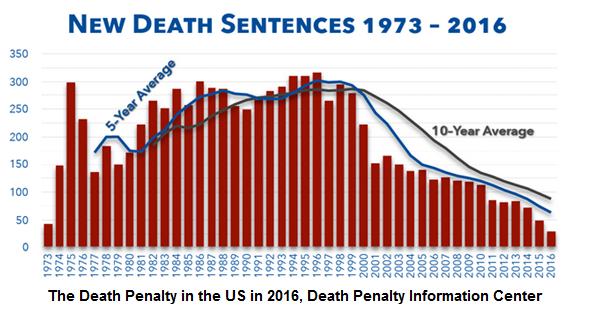
Article(s)
A new decline in the use of the death penalty in the US in 2016
By Elise Guillot, on 17 January 2017
With 30 death sentences pronounced and 20 executions carried out, the use of the death penalty in the USA saw a new record decline in 2016, as reported in the Death Penalty Information Center’s year-end report. Nevertheless, the abolitionists are worried that 2017 may not be so successful.
2017
Cruel, Inhuman and Degrading Treatment and Punishment
Public Opinion
United States

Article(s)
Discussing the Death Penalty for Drug Crimes at the Human Rights Council
By Elisa Bellotti, on 30 September 2015
The Advocates for Human Rights and Together against the Death Penalty (ECPM), in partnership with other members of the World Coalition, organized a Round Table on the issue of the death penalty for drug-related crimes. The event took place during the 30th Session of the UN Human Rights Council, on September 28, 2015.
2015
Drug Offenses

Article(s)
Middle East and North Africa: Abolitionist civil societies in full swing despite a difficult context
By Aurelie Placais, World Coalition Against the Death Penalty, on 15 February 2022
On the occasion of the publication of the Human Rights Watch World Report 2022, the World Coalition looks back at recent developments and civil society mobilization against the death penalty in the Arab world.
2022
Bahrain
Egypt
Fair Trial
Iraq
Moratorium
Morocco
Saudi Arabia
State of Palestine
Terrorism
Tunisia
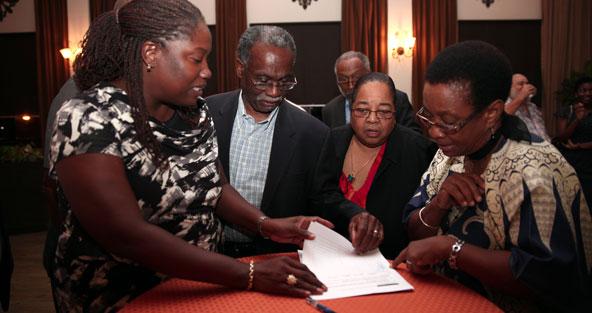
Article(s)
Events, strong words and hard facts to fight death penalty in the Caribbean
By Thomas Hubert, on 11 October 2013
As World Day Against the Death Penalty events unfolded on an unprecedented scale across the region, local activists and international organisations took a firm stance against capital punishment across the Caribbean.
2013
Bahamas
Barbados
Belize
Guatemala
Jamaica
Public Opinion
Puerto Rico
Saint Kitts and Nevis
Trinidad and Tobago
Article(s)
High-Level Remote Panel on the Moratorium Resolution
By Louis Linel, on 6 November 2020
On 5 November, a webinar gathering high-level panelists was held by Ensemble contre la peine de mort / Together Against the Death Penalty (ECPM) as one of their initiatives for the moratorium campaign. Usually organized in New York, USA on the margins of the United Nations General Assembly (UNGA), the event had to be facilitated […]
2020
Algeria
Belgium
Democratic Republic of the Congo
France
Italy
Moratorium
Morocco
Switzerland

Article(s)
Violations of the Right to Life in the Context of Drug Policies
By International Harm Reduction Association (IHRA), Corporación ATS Acción Técnica Social, IDPC Consortium, Washington Office on Latin America, non-governmental organizations in special consultative status, Anti-Death Penalty Asia Network (ADPAN); Capital Punishment Justice Project (CPJP); Centre on Drug Policy Evaluation (CDPE); Cornell Centre on the Death Penalty Worldwide; Eleos Justice - Monash University; Instituto RIA, AC; Iran Human Rights (IHR); World Coalition Against the Death Penalty., NGO(s) without consultative status, also share the views expressed in this statement, on 10 August 2021
Harm Reduction International and co-signatories congratulate Mr Tidball-Binz on his appointment as Special Rapporteur on summary executions. With this statement, we highlight key violations of the right to life enabled by repressive drug policies or reported in the context of drug law enforcement; and encourage this Rapporteur to pay specific attention to the impact of […]
2021
Death Row Conditions
Drug Offenses
Fair Trial
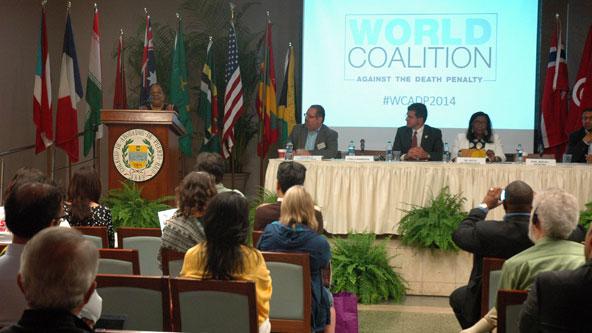
Article(s)
World Coalition raises mental health issues in administration of the death penalty
By Thomas Hubert (in San Juan, Puerto Rico), on 22 June 2014
World abolitionists gathered in Puerto Rico between 20-22 June to take stock on progress in the crucial Caribbean region and prepare for the next round of the fight against the death penalty.
2014
Puerto Rico
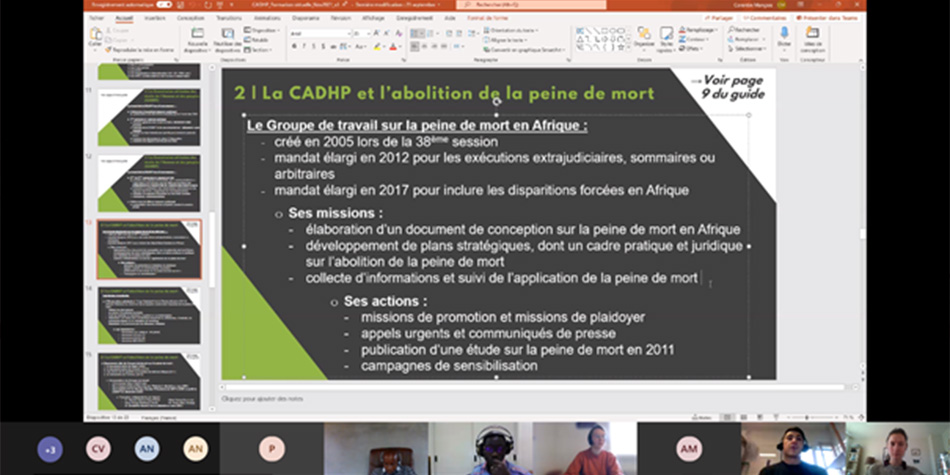
Article(s)
NGO Forum and 69th Ordinary Session of the African Commission of Human and Peoples’ Rights
By Bronwyn Dudley and Corentin Mançois, on 17 December 2021
The ACHPR (the African Commission on Human and Peoples’ Rights) met again virtually for its 69th Ordinary Session from 15 November – 5 December 2021.
2021
Terrorism
Women
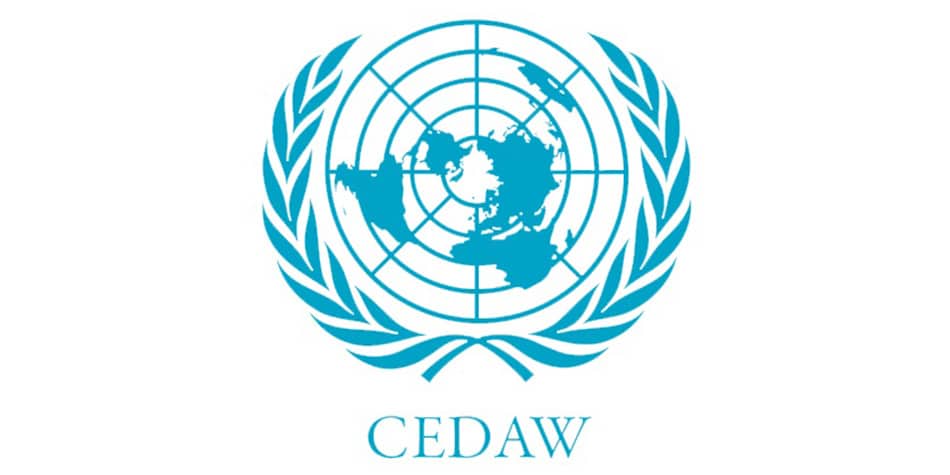
Article(s)
Abolitionist advocacy at the 88th CEDAW Session
on 7 June 2024
The 88th session of the Committee on the Elimination of Discrimination Against Women (CEDAW) was held in Geneva, Switzerland, from May 13 to 31, 2024.
2024
Brazil
Estonia
Gender
Kuwait
Malaysia
Montenegro
Republic of Korea
Rwanda
Singapore

Article(s)
What China’s report to the United Nations tells us about transparency and the death penalty
By World Coalition Against the Death Penalty, on 28 June 2024
In January 2024, China underwent its fourth Universal Periodic Review (UPR) by the UN Human Rights Council. While in all previous reviews, the death penalty was mentioned in the Chinese state report, nothing was reported this year.
2024
China
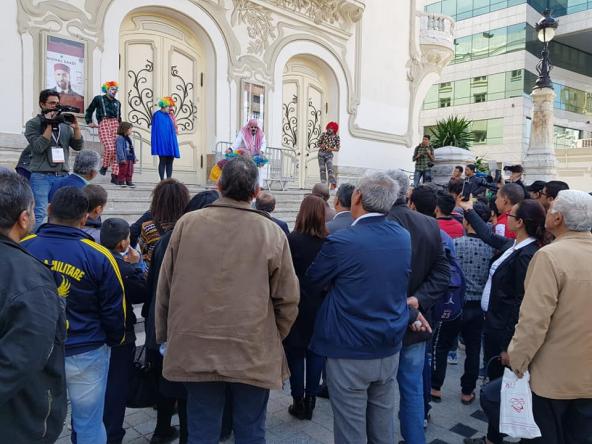
Article(s)
Arab League Summit: the death penalty at the heart of the alternative summit organized by civil society
By Hédia Zaalouni, on 10 May 2019
On the occasion of the 30th session of the Arab League Summit, which took place in Tunis from 26 to 31 March 2019 and brought together 21 Arab delegations, a parallel counter-summit, organized by civil society, was held to address the issue of human rights in the Arab world.
2019
Tunisia
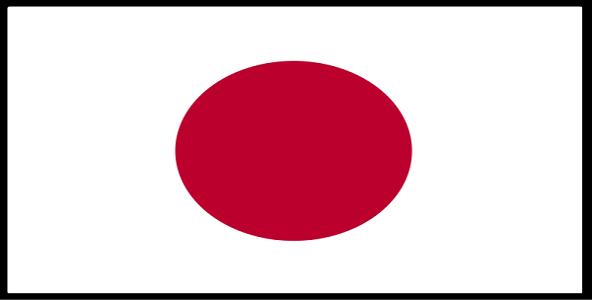
Article(s)
Joint statement of the death penalty in Japan
By Center for Prisoners' Rights and Japan Innocence & Death Penalty Information Center, on 30 March 2018
Joint Statement signed by Center for Prisoners’ Rights and Japan Innocence & Death Penalty Information Center to to call Japanese government for a sincere dialogue while condemning the government for refusing a dialogue with international communityand not accepting capital punishment as a human rights issue.
2018
Japan

Article(s)
How Likely Is the Return of the Death Penalty in Israel?
By World Coalition against the Death Penalty, on 22 May 2023
Early 2023, the newly elected government of Israel announced an ensemble of judicial reforms; including a new bill that would introduce the death penalty for acts of terrorism. As of May 2023, the judicial reforms have been put on hold by the PM Netanyahu. This article takes a historical perspective to recontextualize the issue of […]
2023
Israel

Article(s)
Statement on the end of the unofficial moratorium on executions in Myanmar
By the World Coalition Against the Death Penalty, on 11 August 2022
The World Coalition Against the Death Penalty, and ACAT-France, ACAT-Germany (and their partner organization Federal Association of Vietnamese Refugees in the Federal Republic of Germany), Amnesty International, Anti-Death Penalty Asia Network (ADPAN), Avocats Sans Frontières France, Centre for Civil and Political Rights, Citizens United for Rehabilitation of Errants (CURE International), Coalition Marocaine Contre la Peine […]
2022
Moratorium
Myanmar
Document(s)
Arbitrary and Capricious: Examining Racial Disparities in Harris County’s Pursuit of Death Sentences
By Texas Defender Service, on 24 April 2024
2024
NGO report
United States
More details See the document
Published on February 2024.
Texas has executed more people than any other state. However, out of the 254 counties in Texas, 136 have never sent an individual to death row. Harris County—Texas’s largest county and home to the city of Houston—stands out as the “death penalty capital of the world.” Harris County has executed more people than any state in the United States except Texas3 and is responsible for a quarter of the 1,124 people who have been sent to Texas’s death row since 1973.
- Document type NGO report
- Countries list United States
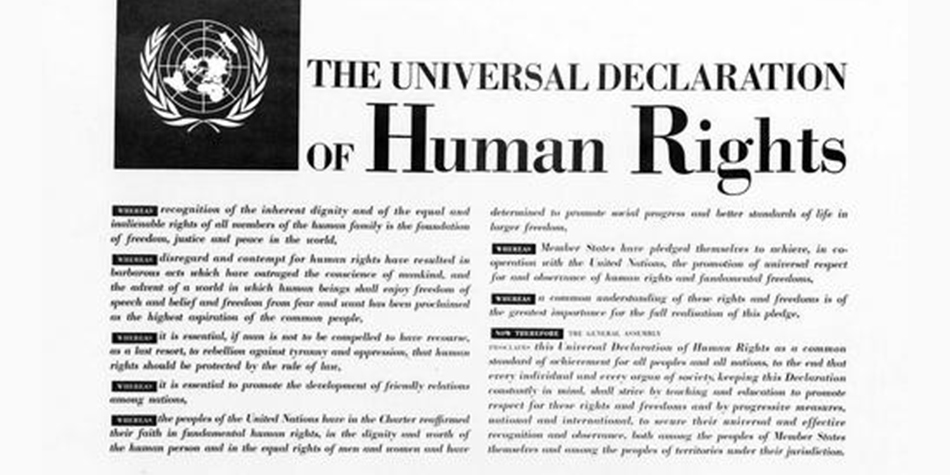
Article(s)
Statement on the occasion of the International Human Rights Day
By World Coalition Against the Death Penalty, on 10 December 2020
Humanity and the global human rights movement, including the World Coalition Against the Death Penalty, are celebrating the 72nd anniversary of the adoption of the Universal Declaration of Human Rights on 10 December 1948. This day has been commemorated by the United Nations as International Human Rights Day.
2020
Moratorium
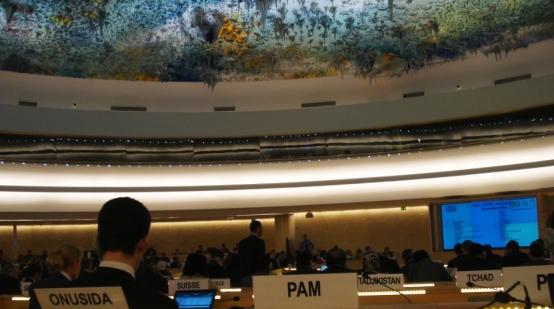
Article(s)
Children of people sentenced to death attract the UN’s attention
By Léa Macarez, on 19 September 2013
The UN Human Rights Council brought together representatives from civil society, States and the UN itself to discuss the rights of children whose parents are sentenced to death or executed.
2013
Juveniles
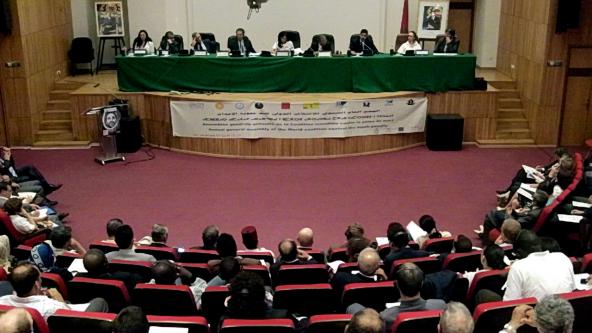
Article(s)
Arab spring at the heart of World Coalition debates
on 26 June 2011
International abolitionists gathered in Morocco have discussed the recent wind of change in the region and the resulting hope for the abolition of the death penalty.
2011
Cruel, Inhuman and Degrading Treatment and Punishment
Iraq
Morocco
Terrorism
Tunisia
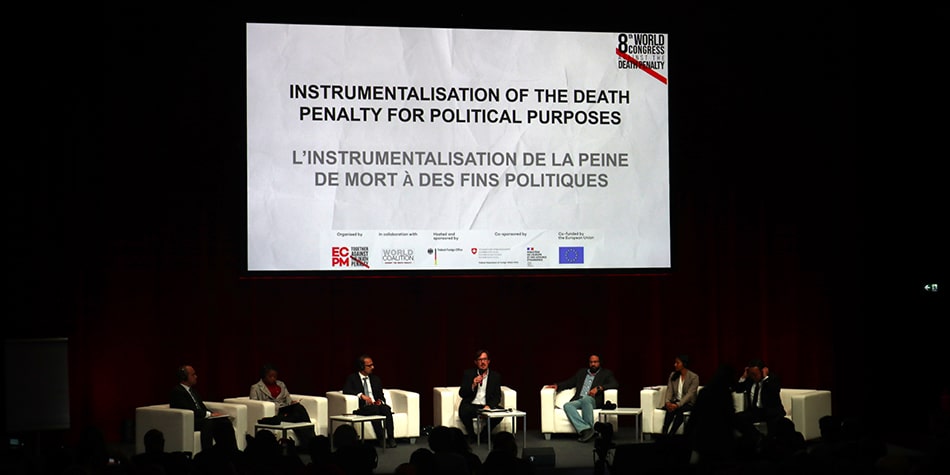
Article(s)
How the Death Penalty is Politicized: A Reflection on the 8th World Congress Against the Death Penalty
By Dunia Schaffa, on 27 January 2023
During the 8th World Congress Against the Death Penalty, in Berlin Germany, the phrase “the death penalty is being used as a political tool” was used frequently – in panels, in round tables, in speeches, even amongst the participants getting a coffee in between Congress events.
2023
Iran (Islamic Republic of)
United States
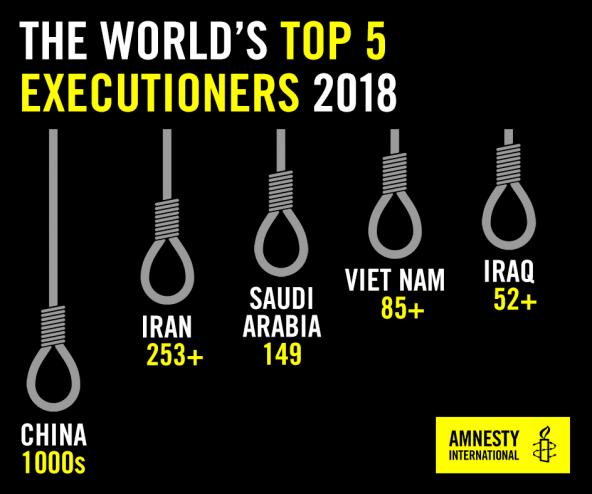
Article(s)
Death penalty 2018: Dramatic fall in global executions
By Amnesty International, on 10 April 2019
Despite a rise in executions in some countries, global executions fell by 31% in 2018. The universal fight for the abolition of the death penalty seems to be on the right way.
2019
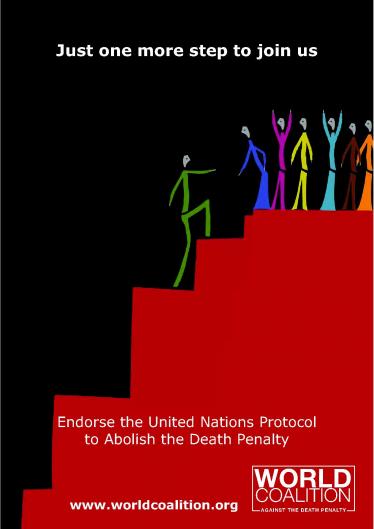
Just One More Step: Ratifying International and Regional Protocols
on 28 March 2022
As of 10 June 2024, 91 of the 173 States parties to the ICCPR have ratified or acceded to its Second Optional Protocol aiming at the abolition of the death penalty, most recently Côte d’Ivoire (3 May 2024), Kazakhstan (24 March 2022), Armenia (18 March 2021), Angola (2 October 2019) and the State of […]
2022
Central African Republic
Chad
Congo
Fiji
Ghana
Marshall Islands
Samoa
Sierra Leone
Suriname
Zambia

